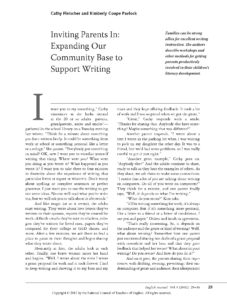Author: Cathy Fleischer and Kimberly Coupe Pavlock
Summary: Looking for ideas for ways to reach out to parents to help them understand why we teach writing in the ways we do and to share successful strategies for how they might help their children or teens with writing? And what about looking for ways to build awareness of the connections between high school and college writing? This article, filled with research-based strategies and examples for those seeking to facilitate such experiences, also makes a case for how successful workshops with parents can help them expand their knowledge beyond what they know from media and legislative mandates to become “informed, knowledgeable readers of educational reform and potential advocates for change.”
Original Date of Publication: July 26, 2012
Excerpt
It’s a truism that working with families and learning from them about their children gives us a kind of insider knowledge about our students’ learning styles and backgrounds—an insider knowledge that is invaluable in understanding what makes students tick and what ways of teaching might work best. And as a predominately white middle-class teaching force meets an increasingly diverse and multicultural student population, we need these kinds of partnerships more than ever, so that we can approach the challenges of teaching with as much knowledge and as much understanding as possible.
But we want to argue that outreach to families has other purposes as well, especially as a means of helping families understand why we teach in the ways we do. Because the ways we teach writing are often quite different from the ways most of our students’ parents learned to write, these parents are sometimes understandably confused about what literacy instruction is all about: both the terminology of writing instruction (process writing, minilessons, craft lessons) and the best ways they can help their children or teens with their writing. Especially in an age in which many in the community get their primary information about pedagogy from newspaper accounts and legislative mandates, we think it is incredibly important for us to reach out to parents and communities to help them understand the kinds of research-based practices we know work. Think of it in two ways: We want parents to be both informed, knowledgeable readers of educational reform and potential advocates for change.
Related Resources
- “Let’s Talk”: Building a Bridge Between Home and School
- The Family Writing Project: Creating Space for Sustaining Teacher Identity
Original Source: National Writing Project, https://www.nwp.org/cs/public/print/resource/3916
